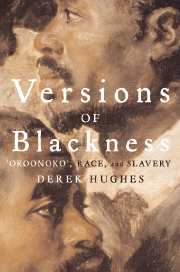Book contents
- Frontmatter
- Contents
- Introduction
- A Note on the Texts
- Chronology
- PART ONE THE MAJOR TEXTS
- PART TWO CONTEXTS: EUROPE, AMERICA, AND AFRICA
- A Short Account of the Destruction of the Indies
- Democrates Secundus
- “Of the Cannibals” and “Of Coaches”
- On Spreading the Gospel Among the Savages
- The English-American his Travail by Sea and Land
- A True and Exact History of the Island of Barbados
- The History of Sir Francis Drake
- Voyage de la France Equinoxiale en l'Isle de Cayenne
- An Exact Relation of the Most Execrable Attempts of John Allin
- The History of the Caribby-Islands
- Histoire Generale des Antilles Habitées par les François
- An Impartial Description of Surinam
- Great Newes from the Barbadoes
- The Negro's and Indians Advocate
- Friendly Advice to the Gentlemen Planters of the East and West Indies
- DISCUSSIONS OF COLONIALISM
- Bibliography
- Index
A Short Account of the Destruction of the Indies
Published online by Cambridge University Press: 05 June 2012
- Frontmatter
- Contents
- Introduction
- A Note on the Texts
- Chronology
- PART ONE THE MAJOR TEXTS
- PART TWO CONTEXTS: EUROPE, AMERICA, AND AFRICA
- A Short Account of the Destruction of the Indies
- Democrates Secundus
- “Of the Cannibals” and “Of Coaches”
- On Spreading the Gospel Among the Savages
- The English-American his Travail by Sea and Land
- A True and Exact History of the Island of Barbados
- The History of Sir Francis Drake
- Voyage de la France Equinoxiale en l'Isle de Cayenne
- An Exact Relation of the Most Execrable Attempts of John Allin
- The History of the Caribby-Islands
- Histoire Generale des Antilles Habitées par les François
- An Impartial Description of Surinam
- Great Newes from the Barbadoes
- The Negro's and Indians Advocate
- Friendly Advice to the Gentlemen Planters of the East and West Indies
- DISCUSSIONS OF COLONIALISM
- Bibliography
- Index
Summary
Bartolomé de las casas (1474?–1566) emigrated to Hispaniola at the age of twenty-eight, trained for the priesthood ten years later, and entered the Dominican order. He became horrified by the oppression of the Native Americans and published the Short Account of the Destruction of the Indies in 1542. Charles V appointed a committee to investigate his allegations, but the committee rejected them.
Las Casas's work became a key text in differentiating English moderation from the cruelty of Spain. The current translation, by Milton's nephew John Phillips, appeared at the time of Cromwell's campaign in the Caribbean, which was inspired by the belief that the Native Americans would welcome British liberation from the oppressive Spanish. Phillips' dedications, to Cromwell and “All True Englishmen,” vigorously support the campaign. Thomas Gage's The English-American (1648) and Davenant's The History of Sir Francis Drake (1658), excerpted below, are associated with the same movement (which Gage played a part in inspiring).
Las Casas's work was first translated into English as The Spanish Colonie in 1583, at the time of the revolt of the Low Countries against Spain. Another translation, Popery Truly Display'd in its Bloody Colours, appeared in 1689, after the revolution that deposed the Catholic James II (which Behn is sometimes thought to have foreseen when she wrote Oroonoko). All three translations thus speak to a specific political moment.
The following excerpt contains an account of the kidnapping of a Native American prince in circumstances very similar to those of Oroonoko's abduction.
- Type
- Chapter
- Information
- Versions of BlacknessKey Texts on Slavery from the Seventeenth Century, pp. 281 - 284Publisher: Cambridge University PressPrint publication year: 2007
- 2
- Cited by



